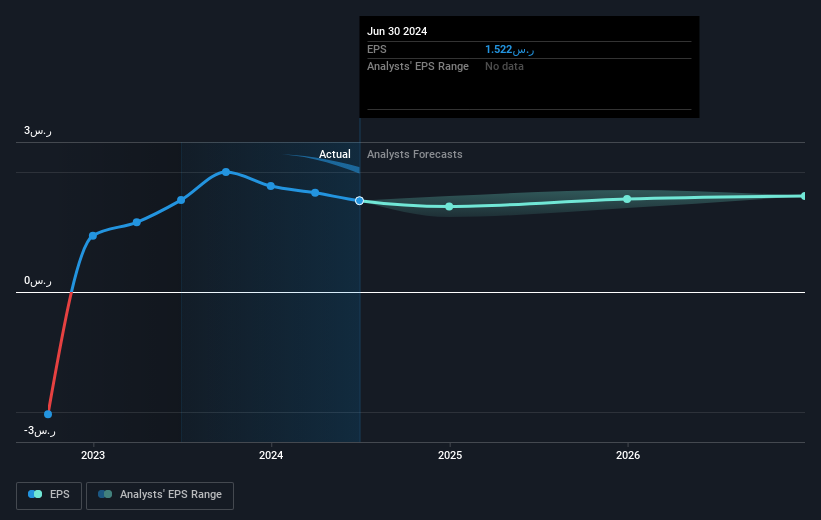- Saudi Arabia
- /
- Food
- /
- SASE:6010
The one-year decline in earnings for National Agricultural Development TADAWUL:6010) isn't encouraging, but shareholders are still up 22% over that period

It's understandable if you feel frustrated when a stock you own sees a lower share price. But sometimes a share price fall can have more to do with market conditions than the performance of the specific business. So while the The National Agricultural Development Company (TADAWUL:6010) share price is down 42% in the last year, the total return to shareholders (which includes dividends) was 22%. And that total return actually beats the market decline of 4.7%. Longer term shareholders haven't suffered as badly, since the stock is down a comparatively less painful 25% in three years. Shareholders have had an even rougher run lately, with the share price down 11% in the last 90 days.
Given the past week has been tough on shareholders, let's investigate the fundamentals and see what we can learn.
See our latest analysis for National Agricultural Development
In his essay The Superinvestors of Graham-and-Doddsville Warren Buffett described how share prices do not always rationally reflect the value of a business. One way to examine how market sentiment has changed over time is to look at the interaction between a company's share price and its earnings per share (EPS).
Unfortunately National Agricultural Development reported an EPS drop of 0.7% for the last year. The share price decline of 42% is actually more than the EPS drop. Unsurprisingly, given the lack of EPS growth, the market seems to be more cautious about the stock.
You can see below how EPS has changed over time (discover the exact values by clicking on the image).

We know that National Agricultural Development has improved its bottom line over the last three years, but what does the future have in store? It might be well worthwhile taking a look at our free report on how its financial position has changed over time.
What About The Total Shareholder Return (TSR)?
Investors should note that there's a difference between National Agricultural Development's total shareholder return (TSR) and its share price change, which we've covered above. The TSR is a return calculation that accounts for the value of cash dividends (assuming that any dividend received was reinvested) and the calculated value of any discounted capital raisings and spin-offs. National Agricultural Development's TSR of 22% for the 1 year exceeded its share price return, because it has paid dividends.
A Different Perspective
We're pleased to report that National Agricultural Development shareholders have received a total shareholder return of 22% over one year. That's better than the annualised return of 21% over half a decade, implying that the company is doing better recently. Given the share price momentum remains strong, it might be worth taking a closer look at the stock, lest you miss an opportunity. While it is well worth considering the different impacts that market conditions can have on the share price, there are other factors that are even more important. For example, we've discovered 1 warning sign for National Agricultural Development that you should be aware of before investing here.
If you like to buy stocks alongside management, then you might just love this free list of companies. (Hint: many of them are unnoticed AND have attractive valuation).
Please note, the market returns quoted in this article reflect the market weighted average returns of stocks that currently trade on Saudi exchanges.
Valuation is complex, but we're here to simplify it.
Discover if National Agricultural Development might be undervalued or overvalued with our detailed analysis, featuring fair value estimates, potential risks, dividends, insider trades, and its financial condition.
Access Free AnalysisHave feedback on this article? Concerned about the content? Get in touch with us directly. Alternatively, email editorial-team (at) simplywallst.com.
This article by Simply Wall St is general in nature. We provide commentary based on historical data and analyst forecasts only using an unbiased methodology and our articles are not intended to be financial advice. It does not constitute a recommendation to buy or sell any stock, and does not take account of your objectives, or your financial situation. We aim to bring you long-term focused analysis driven by fundamental data. Note that our analysis may not factor in the latest price-sensitive company announcements or qualitative material. Simply Wall St has no position in any stocks mentioned.
About SASE:6010
National Agricultural Development
Engages in production of agricultural and livestock products in the Kingdom of Saudi Arabia and internationally.
Flawless balance sheet with solid track record.
Similar Companies
Market Insights
Community Narratives


